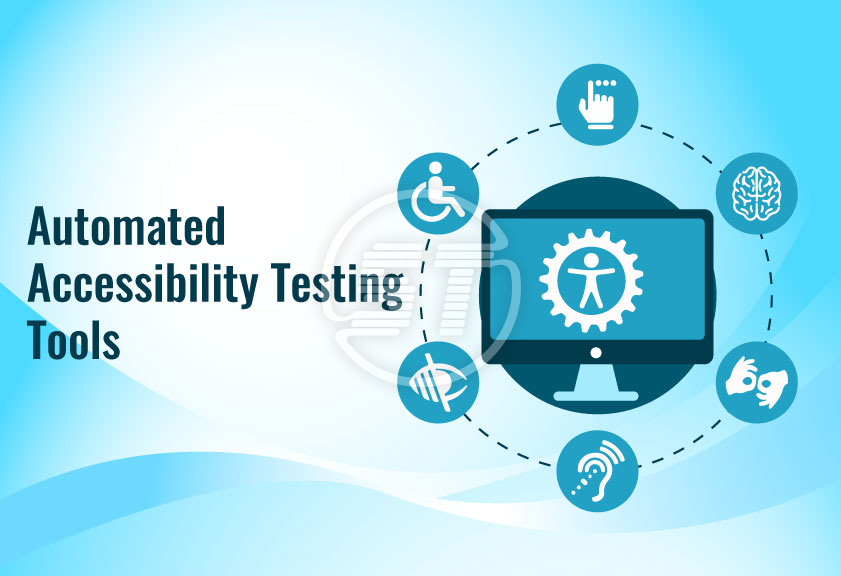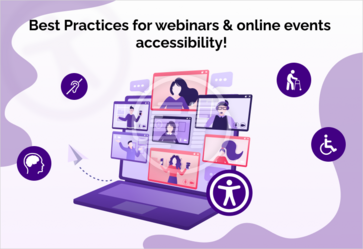ADA website compliance is a great place to start your website accessibility journey. The automated accessibility testing tools deliver a great way to quickly provide a list of required improvements to ensure your digital asset is compliant.
Often, small and medium-sized organizations prefer automated accessibility testing because of its quick, cost-effective, and comprehensive results.
Can automated accessibility testing tools be used as a standalone tool to assess whether your website meets the Web Content Accessibility Guidelines (WCAG)? Let’s take a deep dive into it:
Areas wherein automated accessibility testing tools succeed!
Content
User-generated inaccessible content can be identified by testing tools. Myriad New-aged content management systems have built-in tools to help even non-developers to create and post content easily. Such content is simple to scan and locate errors due to the limited nature of these content additions.
For example, identifying missing alt text is easy for automated tools. Similarly, color contrast can be outlined by automated testing tools evaluating the foreground and background value from the associated Cascading Style Sheets (CSS).
Page Structure
A logical and proper structure is needed for each webpage to provide a correct understanding of information to assistive technology and users.
For example, if a page doesn’t have a unique page title, scanning tools can detect missing or duplicate titles. Another element is page language; the language attributes are standard and easy to catch if they are improper. Moreover, web pages have several elements with standard coding, they can be scanned by automated tools.
Forms
Another great use case is checking forms. An Automated tool can quickly derive if the forms are missing labels or are labelled twice.
YOU MAY ALSO LIKE: How to perform a seamless accessibility audit of your website?
Web accessibility areas where automated accessibility testing tools cannot be relied on!
Specific standards of WCAG
WCAG has provided some conditional remediation techniques that are troublesome for automated tools to follow. For example, automated testing tools can’t show errors for skip links because they might not work properly for mobile layouts because of smaller displays.
Automated testing tools can only find out if the headings or other structures (footer and main body) exist or not, but they are not able to identify the intent of the structure, which is important to meet accessibility standards.
Complex code
Developers often apply complex code to fulfil some specific requirement of the website. Automated tools cannot scan such code; hence it becomes difficult to know accessibility errors for that part.
New-aged patterns
In myriad modern CMS, there are patterns to elevate user experience by creating innovative designs. However, the patterns have pre-created code that might contain accessibility issues and often, testing tools are unable to find out those issues.
Accessibility Widget
Most importantly, if a website has integrated any accessibility widget or plugin to achieve accessibility, the tool scans the website before the widget gets triggered and shows accessibility errors even if they don’t exist.
YOU MAY ALSO LIKE: Top Web accessibility testing tools
Following are some of the prominent automated accessibility testing tools
Free Website Accessibility Checker
Free website accessibility checker evaluate website's inclusivity and compliance with accessibility standards such as WCAG 2.0, 2.1, and 2.2 (web content accessibility guidelines).
Price: It is available in both free and paid versions. The paid version comes in four different pricing tiers: 1. Annual subscription for 100 pages per month at $899, 2. Annual subscription for 250 pages per month at $2199, 3. Annual subscription for 500 pages per month at $4299, and 4. Annual subscription for 1500 pages per month at $12299.
WAVE (Web Accessibility Evaluation Tool)
WAVE is an automated testing tool by WebAIM, which is available online and is a Firefox add-on as well. It accesses websites in the browser and never save any information on the server. The tool also provides recommendations to resolve accessibility issues.
Price: It has both free and paid versions available. Paid version has three pricing editions: $0.25 per credit for 10000+ WAVE API credits, $0.3 per credit for 1000- 9999 WAVE API credits, and $0.4 per credit for 250-999 WAVE API credits.
JAWS (Job Access with Speech)
JAWS is a renowned tool to scan accessibility issues for visually impaired users. Multi-lingual Eloquence and Vocalizer Expressive synthesizers are the most noticeable features of JAWS. It works perfectly with Internet Explorer, Firefox, Microsoft Office, and Windows via touchscreen gestures. JAWS also support IE’s MathML content, and it gives access to text and PDF files with its OCR feature. Additionally, it can also help with braille testing.
Price: $95 per year for its basic plan.
Dyno mapper
This automated testing tool analyses the website’s HTML content. It has features to generate a sitemap from any URL and import XML files to make a sitemap. With content inventory and audit features, it can filter pages, files, and photos among other things. The advanced crawler option helps in organizing links and there are myriad other features to update and customize the website.
Price: $99 per month, $360 per month, and $450 per month.
Accessibility Checker
Accessibility Checker has enhanced features to validate content, report issues, and fix them. It has an accessibility checking engine to add more flexibility to its testing capabilities. Accessibility Checker has a quick fix feature that resolves common issues instantly and saves time. Interestingly, it has a Listening Mode option, which can be used to do manual changes if needed.
Price: Webpages from various domains can be scanned for $59 up to 25 scans.
AChecks
AChecks tool is a trusted tool for several small and medium businesses. It is an open-source accessibility testing tool, which checks accessibility by using a URL or HTML file. It scans websites for different accessibility standards such as WCAG, Section 508, HTML Validator, BITV 1.0, Stanca Act, etc. This tool can be downloaded and installed for using in both online and offline way.
Free accessibility toolboxes of AChecks are: AChecker + Web Checker, AChecker Legacy, WCAG 2 Color Contract Checker, Tingtun PDF Checker.
Lighthouse
Lighthouse is an open-source automated testing tool. It can run in Chrome DevTools from the command line or as a Node module. Provide a URL to Lighthouse and it will audit, identify a series of accessibility issues, and generate a report on page performance. Those reports have recommendations to fix the issues.
Axe by Deque
The tool is built on one of the most popular accessibility testing libraries, axe-core. It has different toolkits like axeDevTools, axe auditor, and axe monitor. The testing tools by Deque are trustworthy and claim to provide maximum accessibility coverage as per WCAG standards and save time by finding errors while coding. Suitable for every size of business including enterprises.
Automated accessibility testing tools are beneficial for small and medium businesses!
Key reasons are,
- Automated testing tools can be a great start to understand how well your website or digital asset complies with WCAG guidelines.
- These tools are handy if you require to scan a large volume of site pages and audit compliance issues quickly.
- Those automated accessibility testing tools are very impactful to monitor web pages at some regular interval.
YOU MAY ALSO LIKE: Importance of ADA and WCAG Testing
Is web accessibility testing with automated accessibility tools enough to check compliance?
Automated accessibility testing tools are cost-effective, easy to use, and catch multitude of issues quickly. Although, this efficiency is very helpful to any organization; they have some constraint:
Limited Coverage: Automated accessibility tools can’t test websites against all the WCAG success criteria and will only be reliable to find 20 to 30% of accessibility issues. This means 70 to 80% of issues will not be detected.
False Positives: All the automated tools are not created equally, and the levels of coverage vary between them; and are known to generate false positives; where a success criterion would be tested and passed by automated tools, the result could be incorrect.
Automated scans fall short as they are limited by some conditions. A complete assessment of a website's accessibility requires dynamic thinking that can process whether certain WCAG success criteria are met. So far, no AI tools can replicate the human mind when testing accessibility.
Human experts can review the results reported by automated accessibility checking tools. They also dig deeper into other important areas and capabilities of your website that automated tools can't assess.
Thus, to ensure web accessibility, both manual and automated testing is mandatory.
Likewise, having reports like VPAT, and Accessibility conformation reports would enable more confidence in respect to how and what has been done to ensure the compliance standards.
As an associate member of International Association of Accessibility Professionals (IAAP), Skynet Technologies is a part of Global accessibility community. Our commitment to the IAAP guarantee people all over the world to understand and implement accessibility strategies.
We provide 360° website accessibility audit for WCAG 2.1, 2.2, ADA, and Section 508 compliance. It includes automated WCAG audit, manual ADA and WCAG audit, assistive technology testing, and ADA web accessibility audit report. You can contact us at hello@skynettechnologies.com or request a quick ADA website accessibility audit quote .


